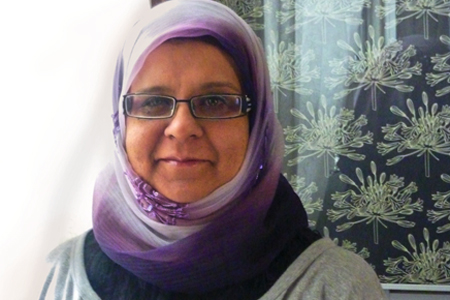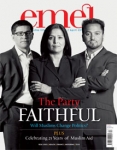
After Hardship Comes Ease - Yasmin Bandali
Issue 67 April 2010
Returning home after a trip abroad, Yasmin Bandali began suffering from headaches and was diagnosed with Intercranial Hypertension. She discusses receiving a new lease of life after her illness and being inspired to enrol as a mature student at City University.
Ten years ago, I came back from a trip to Iraq and had a sudden headache, which then lead to problems with my vision and nausea.
I had taken my kids to Arabic school and I realised that there was no way I’d be able to drive them home. I called my husband and he came to pick us up
Initially, I thought I was just tired from the trip, and that I had a standard migraine. But when the headaches didn’t subside and got worse, I was afraid it might be something more serious. As a child, I had lost my right eye to a tumour and became worried it may be another. The next day, I went to see my GP who said that I should go to the hospital, which scared me even more. The GP rang several hospitals for me to be seen to as soon as possible.
At the hospital, I was praying that things would be okay, and that I didn’t have a brain tumour. My children were young at the time and I couldn’t help but imagine the worst. At the hospital, I had an MRI scan and was sent home to await the results.
I got a call from the hospital the next day to say they couldn’t find anything on the scan, but that they’d like me to come in to see the neurologist. They carried out more tests and I had a spinal tap which revealed that I had raised intracranial pressure, which is pressure in the brain.
I was diagnosed with a condition known as ‘benign intracranial hypertension’, which is a rare condition in which your brain produces more cerebrospinal fluid than normal, causing pressure to rise in your brain. This was the cause of the headaches, the visual disturbances and the nausea.
And so began a year of constant trips to the hospital and the loss of my ability to lead a normal life. Simple things such as counting money, trips to the supermarket and retaining memory became difficult. I found myself losing my independence completely. I felt as though I was slowly deteriorating; the condition affected most of my senses, leaving me helpless and often frusrated.
Without the support of my husband, parents and extended family, life would have become unbearable. We never discovered the cause of the condition or what triggered it. The fact that my doctors couldn’t give me an explanation meant that I often thought ‘Why me?’ and felt sorry for myself.
The only thing that kept me going was the support of the people I knew and loved. They’d tell me constantly that they were praying for me, and I strongly believe that those prayers helped me during that time and afterwards, too.
A year after being diagnosed with the condition, my doctors suggested surgery. They told me the surgery would involve inserting a shunt to drain the excess fluid from my brain to my stomach. I had to have my hair shaved off prior to the surgery, and I’ve never been more glad to wear hijab!
On the morning of the surgery, I remember the surgeon saying to me that this was a high risk procedure and that I could potentially die. I looked at him and replied, ‘it’s all in God’s hands now’.
My physical condition improved gradually after the surgery but I still felt that my memory remained poor and was adamant to do something about it. I began to think that God had given me another lease in life, and that I shouldn’t waste it.
When I was on the neurological ward, the work of the speech and language therapists always inspired me. I always wanted to do a job where I was helping people and watching the therapists on the ward convinced me that this was the job for me. I decided to take the plunge and apply to university as a mature student.
After four years, I graduated at the age of 41. Today I work as a highly specialist speech and language therapist for adults with learning disability. I feel very privileged in the work that I do. I love my work and feel very humbled by the people and the families I work with.
My experiences during my illness helped me to become a more empathic therapist. In hindsight, the illness lead to a greater good; I needed that nudge from God to get to where I am today.
I also feel that if we are determined to achieve in life, if we take one step then God will help us to take 10 more.
Bookmark this |
|
Add to DIGG |
|
Add to del.icio.us |
|
Stumble this |
|
Share on Facebook |
|
Share this |
|
Send to a Friend |
|
Link to this |
|
Printer Friendly |
|
Print in plain text |
|


Comments
0 Comments